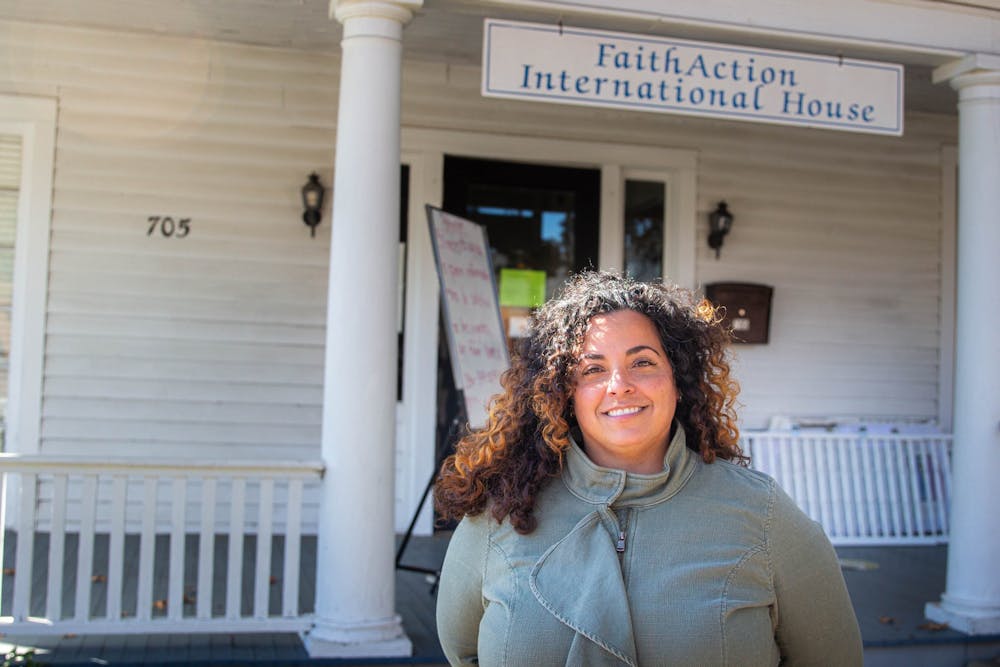Eniris Riddick, the interim executive director of FaithAction International House, was working in her office last week when she received a phone call from a construction worker saying he was unable to work because of COVID-19. The construction worker was distraught and needed help — he and his family were in jeopardy of being evicted from their home.
“He was real desperate because he didn’t have anybody in this country … He was going to sleep on the street that night, including his children,” Riddick said.
FaithAction International House assisted the construction worker and his family by contacting the landlord of the home to stop court proceedings on eviction and formed a plan to help him find a stable job.
The construction worker is one of many individuals in the Latinx and Hispanic communities among Alamance and Guilford counties that has faced economic difficulties and hardships — challenges paying rent, obtaining food, and receiving broadband internet access — due to the COVID-19 pandemic.
These difficulties can be tied to economic disparities the Latinx and Hispanic communities face as a result of the pandemic. According to the Federal Reserve Bank in 2021, the Latinx community has an unemployment rate of 6.3%, compared to the 4.2% rate of white populations in the nation.
Organizations, such as FaithAction International House in Greensboro and Centro La Comunidad in Burlington, are assisting Latinx and Hispanic residents by providing assistance to those struggling with paying their rents and facing language barriers in an online educational environment.
Centro La Comunidad is connecting families with tutoring services sponsored by the Alamance-Burlington School System. Lucy Rubiano, a family support specialist at Centro La Comunidad, said the shift to online classes during the pandemic caused issues of low broadband internet access to surface in some regions of the county, where a high population of Latinx and Hispanic residents reside.
“Online classes has been very hard for them. Some parents doesn’t even speak English or their education are very limited,” Rubiano said. “They are not sure if the instruction has been delivered in a complete way that the kids can learn and keep in mind for the next year.”
Bridging the language barrier between those who speak English and Spanish-speaking families is a step toward allowing children to be able to better understand and retain material spoken in online classes, according to Rubiano.
She is responsible for facilitating meetings between parents and English as a second language teachers to ensure Spanish-speaking children are not being left behind in the classroom. The meetings help to foster direct and open communication between the parents and the teachers.
FaithAction International House is working alongside the Burlington-based agency to provide relief to Latinx and Hispanic individuals through opening a food pantry and giving out household products to families with young children.
In addition, FaithAction International House established a COVID-19 relief fund to deliver financial aid and food security. According to a 2020 FaithAction Impact report, the agency provided over $100,000 in COVID-19 rent, food and bill relief.
Riddick said FaithAction International House is continuing to provide emergency assistance to residents and families affected by COVID-19 through a recent $90,000 grant the organization received from Kate B. Reynolds Charitable Trust.
“Right now, we are the hub,” Riddick said. “We have all these community partners that come through us and through our case management department, we are able to support these agencies and their families.”
Despite an ongoing economic recovery from the pandemic nationwide, many Hispanic and Latinx families and children, including those in Alamance County, remain in need of financial assistance and resource support as they adjust to a life with the presence of COVID-19.
“We work alongside them to help them feel welcome and through case management we make sure that we assist them or basically we hold their hand the time that they arrive here,” Riddick said.


